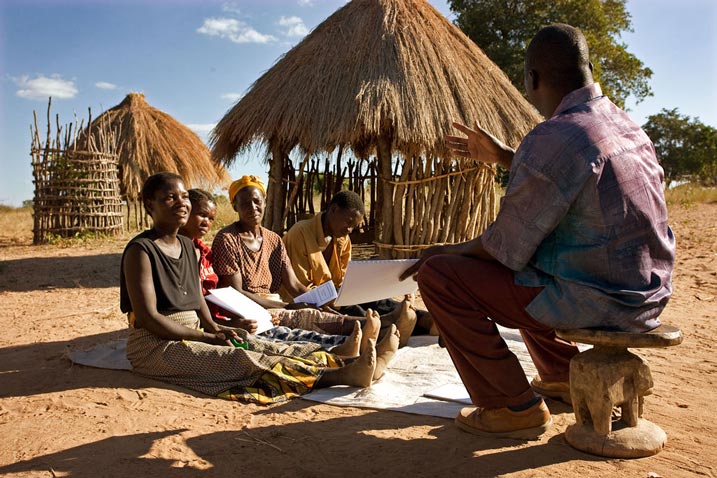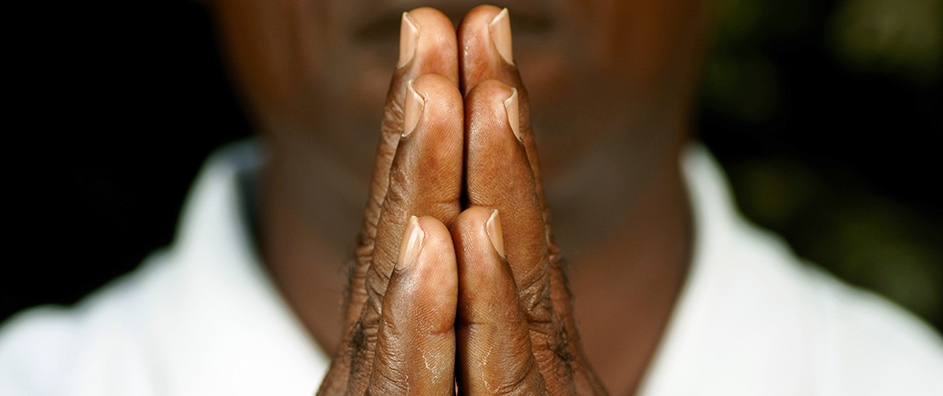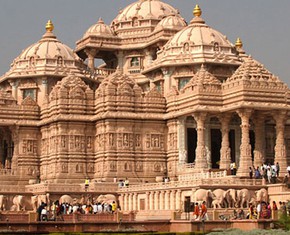The views expressed in our content reflect individual perspectives and do not represent the authoritative views of the Baha'i Faith.
One whose heart is filled with a yearning mystery at the sight of the starry heavens, who can adore the splendor of noble actions, courageous deeds, patient affections, who can see and love the beauty so abundantly shed abroad in the world… he can at all these moments draw near to God, and open his soul to the influx of the divine spirit. – Arthur Benson
There is one God; mankind is one; the foundations of religion are one. Let us worship Him, and give praise for all His great Prophets and Messengers who have manifested His brightness and glory. – Abdu’l-Baha, Abdu’l-Baha in London, p. 20.
“Do Baha’is have churches?”
That question—typically one of the very first questions people ask when they initially encounter the Baha’i Faith—has a short answer, as well as a much deeper and more profound one.
Here’s the short answer: No.

Baha’is in Zambia
Normal follow-up question: “Where do you meet, then?” Typical answer: Many large Baha’i communities have Baha’i centers where people gather; most small Baha’i communities meet in the homes of the Baha’is. Each continent in the world has a Baha’i House of Worship, a temple open to everyone.
But here’s that second, deeper follow-up question: “Well, how do Baha’is worship together if you don’t have a church or a mosque or a temple?”
In this brief series of essays, I’ll do my best to answer that important question, which goes right to the heart of spirituality and religion. The answers, which set the Baha’i Faith apart from many other religions, may surprise you.
But first, let’s think for a minute about the implications of the word worship—what does it mean to worship?
The word comes from an Old English term that means “to show honor” or to “give worth (worth-ship)” to something or someone. Of course, many words exist to describe the ancient concept of worship. In the Bible, initially written in Aramaic, the word for worship—proskuneo–meant “to bow down, to prostrate oneself before God.” In Buddhism, the Pali and Sanskrit word for worship—puja—means giving honor and devotional attention. For Hindus, the word for worship—bhakti—means the expression of devotional love. In Islam, the concept of ibadah means obedience, submission and devotion to God. In Judaism, Avodat Hashem means worshipping God through prayer, devotion and meditation.
Even in twelve-step groups like Alcoholics Anonymous, the first step in the process of healing from addiction involves an admission to God of your powerlessness.
In many Faiths, attending weekly or daily worship services became a ritual long ago. Certain prescribed prayers, rites and actions usually accompany that congregational worship, and those old forms of expressing piety and belief have persisted for centuries, becoming rigid and dogmatic. Everyone is expected to take part, with worship services typically led by the clergy, who sometimes deliver sermons that admonish the congregation for their sins and their shortcomings. The rabbi, the priest, the minister, the guru or the mulla takes on the mantle of authority and leadership, and the congregation follows. Gradually, the outward forms of those worship traditions often take on a life of their own, supplanting and displacing the inner meaning they originally conveyed. Those forms then tend to separate people, acting as a determinant of their identity. In some extreme cases, worship services in many sects and denominations result in the development of a separate group consciousness, which often excludes or even demonizes others.
The Baha’i teachings, with their emphasis on individual spiritual search for the truth, have none of those elements. In fact, the Baha’i writings describe this kind of misguided worship as detrimental to the real spirit of faith:
Most regrettable of all is the state of difference and divergence we have created between each other in the name of religion, imagining that a paramount duty in our religious belief is that of alienation and estrangement, that we should shun each other and consider each other contaminated with error and infidelity. In reality the foundations of the divine religions are one and the same. The differences which have arisen between us are due to blind imitations of dogmatic beliefs and adherence to ancestral forms of worship. – Abdu’l-Baha, Foundations of World Unity, p. 92.
No rigid Baha’i rites or rituals exist. Baha’is are free to worship as they see fit. Baha’is have no clergy, so no Baha’i has more authority than any other Baha’i. When Baha’is gather for prayer, no one delivers a sermon or harangues and criticizes the people who attend. Worship, for a Baha’i, joins daily life directly to a sense of spirituality and service, unifying the individual act of worship with an aware and awakened kinship to all humanity. Most importantly, Baha’i worship does away with the outward forms and superstitions inherent in so many traditions, and focuses solely on building a connection between each individual human being and the Source of all Being:
Take heed lest your devotions withhold you from Him Who is the object of all devotion, or your worship debar you from Him Who is the object of all worship. Rend asunder the veils of your idle fancies! This is your Lord, the Almighty, the All-Knowing, Who hath come to quicken the world and unite all who dwell on earth. – Baha’u’llah, The Summons of the Lord of Hosts, p. 55.
Baha’is view worship in a totally different way than you’ve probably ever heard of before, linking it first to individual prayer and meditation; and then extending it to the work each of us does and the service we extend to all humanity.
Please follow along in this series of essays, as we explore the unique and powerful Baha’i teachings on worship, and see how radically they depart from the current conception of devotion to a higher reality.
















Comments
Sign in or create an account
Continue with Googleor